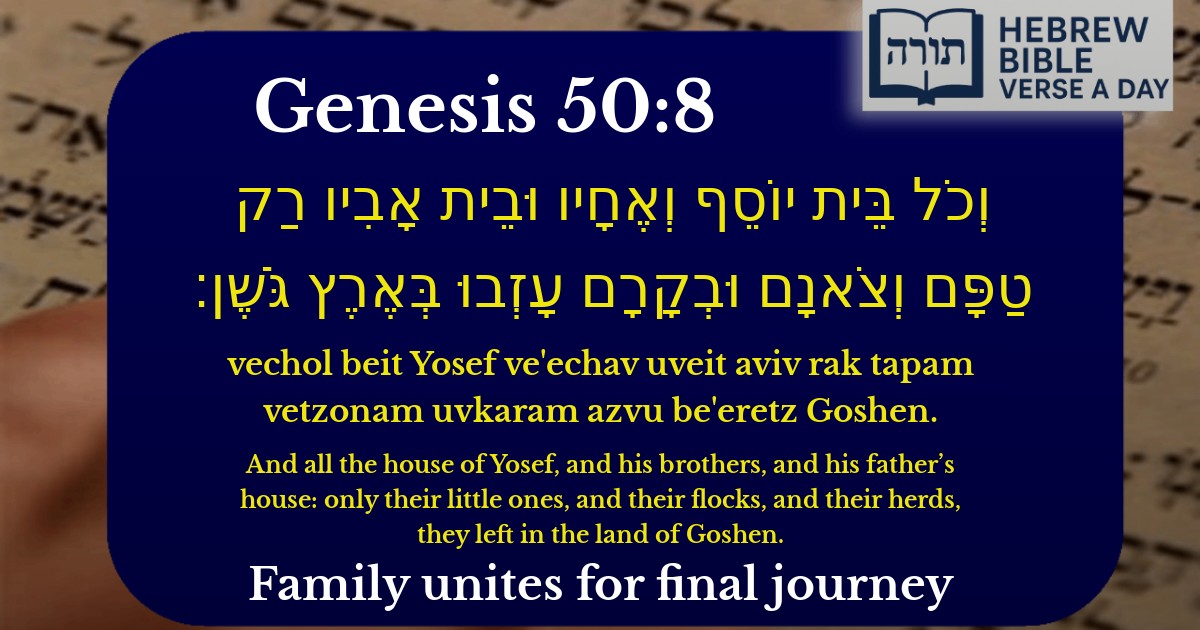Join Our Newsletter To Be Informed When New Videos Are Posted
Join the thousands of fellow Studends who rely on our videos to learn how to read the bible in Hebrew for free!
Hebrew Text
וְכֹל בֵּית יוֹסֵף וְאֶחָיו וּבֵית אָבִיו רַק טַפָּם וְצֹאנָם וּבְקָרָם עָזְבוּ בְּאֶרֶץ גֹּשֶׁן׃
English Translation
And all the house of Yosef, and his brothers, and his father’s house: only their little ones, and their flocks, and their herds, they left in the land of Goshen.
Transliteration
Vechol beit Yosef ve'echav uveit aviv rak tapam vetzonam uvkaram azvu be'eretz Goshen.
Hebrew Leining Text
וְכֹל֙ בֵּ֣ית יוֹסֵ֔ף וְאֶחָ֖יו וּבֵ֣ית אָבִ֑יו רַ֗ק טַפָּם֙ וְצֹאנָ֣ם וּבְקָרָ֔ם עָזְב֖וּ בְּאֶ֥רֶץ גֹּֽשֶׁן׃
וְכֹל֙ בֵּ֣ית יוֹסֵ֔ף וְאֶחָ֖יו וּבֵ֣ית אָבִ֑יו רַ֗ק טַפָּם֙ וְצֹאנָ֣ם וּבְקָרָ֔ם עָזְב֖וּ בְּאֶ֥רֶץ גֹּֽשֶׁן׃
🎵 Listen to leining
Parasha Commentary
📚 Talmud Citations
This verse is not quoted in the Talmud.


Context of the Verse
This verse (Bereishit 50:8) describes the departure of Yaakov's family from Egypt to accompany his body for burial in the Cave of Machpelah in Chevron. The Torah emphasizes that only the children, flocks, and herds remained in Goshen, while the adults—the entire household of Yosef, his brothers, and Yaakov’s household—went up to Eretz Yisrael for the burial.
Rashi’s Explanation
Rashi (Bereishit 50:8) notes that the phrase "וְכֹל בֵּית יוֹסֵף" ("all the house of Yosef") includes not only Yosef’s immediate family but also his servants and attendants. The phrase "וְאֶחָיו" ("and his brothers") refers to the other sons of Yaakov, while "וּבֵית אָבִיו" ("and his father’s household") includes the extended family, such as the families of Yaakov’s sons.
Why Only the Children and Livestock Stayed
Spiritual Significance
The Kli Yakar (Bereishit 50:8) highlights that the separation between those who went to bury Yaakov and those who stayed symbolizes the distinction between spiritual and material concerns. The adults, who were responsible for fulfilling the mitzvah of burial, prioritized this sacred duty, while the children and livestock—representing physical and future concerns—remained behind.
Connection to Future Redemption
The Or HaChaim (Bereishit 50:8) sees a deeper message: just as Yosef and his brothers temporarily left Egypt for a holy purpose but returned, so too would their descendants later leave Egypt permanently for the ultimate redemption. The verse thus foreshadows Yetziat Mitzrayim (the Exodus).